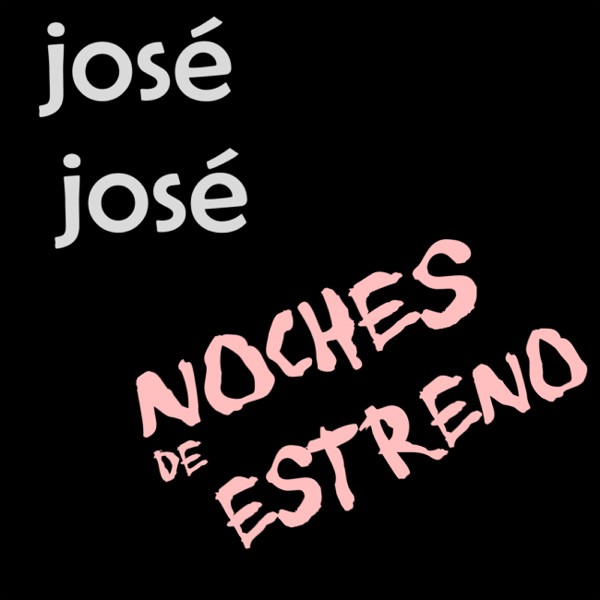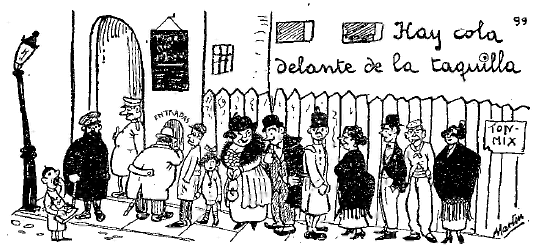
| Языки :: Испанский |
| Аудио |
 |
|
|
297 |
Español |
Spanish |
|
Lección Noventa y nueve (99) |
||
| Noche de estreno (1) | First night [Night of f. performance]. | |
|
— Don Melquides, a poor compositor,
has obtained that one of his works should be acted. But on the first-night, he does not attend the performance ; he has stayed at home with his children Fabio and Laura and the three wait for the result with a certain nervousness. |
||
| 1 |
Don Melquíades. — ¡Ay!... En este momento se levanta el
telón. Laura. — ¿Te lo da el corazón, papá? Mel. — Sí, hijos míos. |
Don Mel. — Ah! at this moment, they raise the curtain — Laura. —It's your heart which tells [gives] you so, dad? — Mel. — Yes my children. |
| 2 |
Laura. — ¿Cómo estará el pobrecito autor del libro entre
bastidores? Fabio. — Como estamos nosotros aquí... escalofrío más o menos. |
Lau. — How must he be, the poor author of the libretto, in the
side-scenes? — Fab. — (He is) as we are here, (with) a shudder more or less. |
| 3 |
Lau. — ¡Ay! yo no quiero pensar que silben la obra! Mel. — ¡Calla, por Dios, que se me pone la carne de gallina! |
Lau. — Oh I will not think that they (might) hiss (subj.) the play! — Mel. — Be silent, by God, it gives me the creeps [puts me flesh of hen]. |
| 4 |
Fab. — ¡Sería horrible! ¡Continuar en este estado de pobreza que nos consume a todos y que a mí me obliga a salir a la calle hecho una lástima (2) ! |
Fab. — It would be horrible! To continue in this state of poverty which wastes [at] us all, and which obliges me to go out into the street in a pitiable aspect [made a pity]. |
| 5 |
En las rodilleras del pantalón parece que llevo matute (3). Luego, ésta es otra : de día... bien se puede salir a cuerpo sin desdoro aunque muerto de frío; pero de noche... ¿quién se lanza a cuerpo, de noche? (4). ¿Cómo le digo yo a mi novia que no tengo gabán? |
In the bagging knees of my trousers, it seems that I carry smuggled-things...;
then there [this] is another (thing); in the day, one can well go out in a coat [at body] without disgrace, although dead with cold, but... at night who ventures out in a coat, at night? How am I going to tell my fiancée that I have no overcoat? |
| 6 |
Lau. — No, si no hace falta que tú se lo digas : con que te vea sin él y tiritando como un perro chino... (5). Fab. — ¡Échalo, échalo a broma, si te parece! |
Lau. — No, in fact [yes] there is no need telling her since she will see (subj.)
you without (one) and shivering like a Chinese dog... — Fab. — Turn [throw] it turn it into a joke, if it amuses you! [if it seems you]. |
| 7 |
Mel. — ¡Y hace bien la muchacha! ¿Qué valen tus trapos junto al pavoroso problema de los acreedores en el caso de una derrota? El del carbón... el de la carne... el de la tienda... ¡Cinco nos amenazan ya con el embargo (6) ! |
And she does well, (this) child. What does your clothing matter compared to the dreadful problem of creditors in the case of a failure [rout] ? The coal-seller [the one of the coal... etc.], the butcher, the grocer, the... Five already threaten us with an execution! |
| 8 | Fab. — Y por si fuera poco, ese vampiro de la casa de préstamos me ha dicho hoy que ya no aguarda más (7). | Fab. — And as if that wasn't enough [in case it were little] that vampire of the pawn-shop has told me to day that he waits no longer. |
| 9 |
Lau. — No te apures, hombre (8) :
se arreglará todo; tendrás macferlán (macfarlán) y dejarán de llamarte en la Castellana el novio de entretiempo. |
Lau. — Don't worry, boy; all'll get right;
you'll have (your) Inverness cape, and they will stop calling you on the Castellana the between-season fiancé. |
| 10 |
Mel. — Es verdad, hija ¿a qué entristecerse? Lau. — ¿Por qué han de silbar la función? |
Mel. — That's true, my daughter, why be sad? — Lau. — Why do you want them to hiss the play [performance] ? |
| 11 |
Mel. — Eso, eso es lo que yo pregunto : ¿por qué han de
silbarla? El libro no es ningún disparate... y ¡ya conocéis la partitura que yo he compuesto! Bernabé, el pobrecillo Bernabé que tanto nos quiere, saltaba hoy en la butaca durante el ensayo general. |
Mel. — Yes [that], that is what I ask : why must they hiss it? The libretto is no silly-thing and you already know the music that I have composed! Barnaby, that poor B. who loves us so much, was jumping in (his) orchestra stall during the dress rehearsal. |
| (Sigue.) | (To be continued.) | |
| (This scene is an extract from La Vida intima (Private Life), a comedy by the famous writers Serafín and Joaquín Alvarez Quintero.) | ||
| EJERCICIOS | EXERCISE : | |
| En el teatro. | At the theatre. | |
| 1 |
Como no tengo abono para este teatro y hoy es estreno,
vamos a tener que andar listos para las entradas. — Efectivamente ya hay cola delante de las taquillas. |
As I have no season-ticket for that
theatre and it is a first night, we shall have to manage [go quick] for the admittance. — In fact there is already a queue before the ticket-office. |
| 2 |
¿Qué localidades sacamos? — Si hubiera todavía butacas de orquesta, estaríamos mejor, pero... |
What seats do we take [draw]? — If there were orchestra stalls left, we should be better but.. |
| 3 |
¿No le gustaría un palco? — No merece la pena, hombre. — Pues no quedan más que butacas de balcón y delanteras de anfiteatro. — Bueno, tome dos delanteras. |
Would not a box, please you? —This is not worth the trouble, my friend. — But there remain only dress-circle seats and balcony seats. — Good, take two balcony seats. |
| 4 |
¿ Entramos ya? — Sí, pase usted; va a ver la sala, que aunque pequeña, es preciosa. |
Shall [do]
we go in now? — Yes, go on, you are going to see the house which, though small, is nice. |
| 5 |
¿Hay que dar algo a la acomodadora? — No se moleste, ya está; déjele su gabán y siéntese. |
Must one give something to
the usher? — Don't trouble, it's (done) already. — Leave her your overcoat and sit down. |
| 6 |
Aquí no estaremos mal, casi frente al escenario. Tuvimos suerte. Mire que desde las plateas hasta el paraíso, no queda un asiento desocupado. |
Here we shall be all right [shall not be badly], nearly opposite the stage.
We have had luck. Notice that from the pit to the gods, there does not remain one seat unoccupied. |
| 7 |
Ya está tocando la orquesta; pronto van a levantar el telón; ¿quiere usted entretanto echar una ojeada al programa? |
The orchestra is already playing; they will soon raise the curtain; will you meanwhile cast a glance at the programme? |
| 8 | Con mucho gusto, a ver : | [Very willingly] with pleasure; let's see : |
|
La Espigadora de San Blas, zarzuela en 3 actos y 5
cuadros, letra de D. Ruperto Vallejo, música del maestro D. Luis Pandero. |
"The Gleaner of St. Blas, a musical comedy in
3 acts and 5 tableaux, libretto by D. Ruperto Vallejo, music by maestro D. Louis Pandero. |
|
|
Tocar una pieza de música, to play a piece of music; don't say jugar here, either (See note 1 in this lesson). |
| NOTES. | |
| 1 |
Estreno, first performance; estrenar,
to perform for the 1st time; |
| 2 |
Hecho una lástima, liter. : made (into) a pity
= in a pitiable state; |
| 3 |
Matute or contrabando, contraband, smuggling, matutero or contrabandista, smuggler, contrabandist. |
| 4 |
A cuerpo, en cuerpo, in one's coat, without an overcoat;
|
| 5 |
Con que, con tal que (+ subj.), so long as, provided that.
The phrase con que at the beginning of a sentence and especially in a dialogue often means : So, therefore, accordingly. Con que, te marchas hoy, al parecer : So you're leaving to-day, it seems... |
| 6 |
Embargo, execution, attachment, trouble; |
| 7 |
Casa de préstamos, liter. : house of loans —
pawning shop. |
| 8 |
No te apures (subj.), don't worry. About that imperative, see Revision lesson 105, paragr. 5. |
